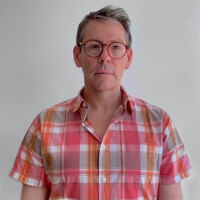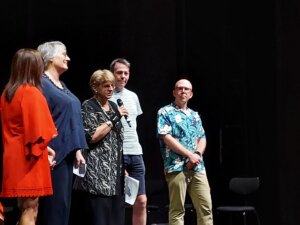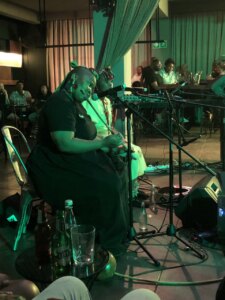
New Music in South Africa – questions for fieldwork
I was grateful to receive support from BCMCR to attend the World New Music Days (WNMD) festival in Johannesburg, Soweto, and Cape Town at the end of 2023. This is the annual gathering of the International Society for Contemporary Music (ISCM), founded in 1922-23 to seek harmonious international relations amidst the chaos of post-War Europe. That history has been and is being revisited with several books forthcoming, as musicologists consider the relation between temporal and spatial politics, between “contemporary” and “international”, or between “new” and “world”.
My approach will be different, but suffice to note, for now, that the ISCM’s membership comprises organisations promoting composers and new music within a given territory and that the festival is itinerant, hosted by a different member each year. Noting its arrival on African soil in ISCM’s historic year, its President Glenda Keam (New Zealand) remarked at the opening concert that “the ISCM’s first century began in Austria; its second century is beginning in South Africa.”

Announcing the Young Composers Award at Artspace, Cape Town
The experience was absorbing and immersive. On returning, I felt like a sponge that was saturated. Not only was there 50-60 hours of live music performed in just 10 days, I had also found myself attending as the British delegate to the ISCM’s General Assembly. Before the first concert, I was invited to participate as one of three judges for the Young Composer Award, and within days had been asked to write one of the official reflections on this festival for the ISCM’s journal (forthcoming). This was participant observation at something of an extreme, but it also meant that I had opportunities to meet a larger cast of actors in the staging of this event, to make friends and expand my network, and to get an “insider’s” sense of what was taking place.
Several days began with conversations over breakfast followed by a three-hour ISCM meeting before the transport arrived for the first of the day’s concerts, which might last two to three hours. After returning to the hotel there might be an hour or so’s break in which to scramble down some notes, then time for the next coach to the evening’s performances that often finished after 11pm, writing some final notes before sleep around 12:30. It was a constant challenge to keep up. In fact, I’m only finishing my notes nearly three weeks after returning to the UK.
At Nick Gebhardt’s suggestion, I had been reading Johannes Fabian’s Time and the Other before my visit. It felt personal. On the one hand, it provided a framework for thinking about the “contemporary” in ISCM relative to its colonial Other. On the other, it raised the problem of “coevality” in ethnographic practice, of using the gap between fieldwork and writing to disavow the con-temporaneity of the subjects being observed. The spatial difference of field and desk could then be temporalised as that between a primitive past an advanced present. Given various difficulties faced by the festival organisers – power cuts, a freak weather event, a personal injury, venue and performer cancellations – I was also aware of Fabian’s concern for the editing process of cutting the experiential time of fieldwork into ordered patterns of argumentation. “No provision seems to be made for the beat of the drums or the blaring of bar music that keep you awake at night; none for the strange taste and texture of food, or the smells and the stench. How does method deal with the hours of waiting, with maladroitness and gaffes due to confusion or bad timing?”![]()

Ancient Voices at Untitled Basement, Braamfontein, Johannesburg
Having squeezed out the well of my memory of the festival, I am now in the process of trying to use my writing and diaristic practices to suffuse myself with it, to trouble the temporal distancing of my fieldwork experience. I am reflecting on the syntax and case of the texts I am working on. That is partly helped by keeping in touch with other participants – and a German researcher I met there, who is also taking it as a case study – and new social media friends. I hope to be granted access to the raw or slightly cooked documentation of performances. I might find myself looking back in some photos, although my on-stage appearance at the closing event may make me blush. Having rushed to the venue – Cape Town’s equivalent of Birmingham’s Symphony Hall – from a delayed and all-too-brief visit to Table Mountain with a former Director of the Southbank Centre, I hadn’t had time to get changed. Whilst all went fine, there are some things perhaps better forgotten!